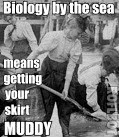Improving access to science careers for underrepresented classes is one of the things that is important to me. And actually, I want more than just improving access to science careers, but I want to make science something that each of my students can feel like belongs to them. This is part of why I'm interested in the habits of mind and history of science angles of science education. I want all of my students to feel like citizens of "the republic of science," as Dr. Alder phrased it at February's Sarton lecture. (Oooh! Name dropping! I must be a grad student.)
So I had some thoughts this morning about teaching under-represented groups, and I wanted to get them down.
Research interests are often motivated by a particular scientist's personal interests, which are a product in part of that person's background. E.g., researchers may choose to go into oncology research because of a family member's illness, or may choose to research a certain type of genetic disease because it runs in the family. It's not an always thing, but it's prevalent enough to be remarked on (June 19 Science article about CF made me think of this.)
Members of underrepresented groups often come from underprivileged classes; minorities, the poor, immigrants, etc. I tend to think of children of color most often when I am thinking about this problem, but there are myriad ways in which people can be cut off from the sort of (over)privilege that makes it easy to get into science. Religious or regional background may even be part of it.
Being from an underprivileged class often means that one is marginalized from the mainstream discourse--actually, that's almost definitional. History of science has for a long time been taught as the history of the white leisure class doing science, which in turn is because science itself has been seen as the purview of the white middle and upper class. (I started to rant about this, but we can take it as read-- it's not hard to demonstrate.) When one's own background is marginalized, it's hard to make science accessible.
One book I'm reading even questions the training that we do in 'habits of mind' -- does training students in the nature of science erode their own cultural values? Are the habits of mind sufficiently generalizable? What kinds of values *might* get eroded by training in the scientific habits of mind, and are they 'real' cultural values or are they 'perceived' values that white academics impose on a foreign culture out of well-intentioned-but-pernicious racism? Do I even know what the hell I'm talking about here?
Not really, no. But this one book, which continues to make me mad, talks about mainstream science's "uncritical acceptance of logical positivism," or the idea that scientific explanations, by dint of being rooted in logic, represent the really *real* way that the world works. In a secondary science classroom, I can see how this would be marginalizing-- not just to the student's background/culture, but to the student herself. If I say things like "This way that you're thinking about it is *wrong*, and here is what *really* happens, and we know because some old white guys figured it out forever ago," then I'm definitely being exclusive. It also seems intuitively like a bad way to teach, though; why would I ever want to tell my students in any way that they are stupid? A more inclusive approach is, "this naive interpretation of things makes a lot of sense from most observations, and it's been fine for most of the uses it's been put to. The world is always more mysterious than we think it is, though, and when we get to other applications, we need more accuracy. And that's why Galileo had to do this acceleration-due-to-gravity experiment, and that's why Copernicus had to completely invert the accepted cosmology in order to get the calendar to work, and that's why Newton had to invent an entire discipline of mathematics in order to understand moving objects."
I'm not sure my Straw-Teacher really exists, and I'm not sure that the way I'm thinking about this isn't also the product of well-meaning-but-pernicious racism. There are an awful lot of naive interpretations and folk interpretations that my students might come to my classroom with--goodness knows I've come to classrooms with ideas that are plain wrong, often--and I just don't want to focus on how those ideas are wrong. Wrong equates to stupid for lots of people, and encouraging their self esteem *while* dismantling their naive assumptions is important to me.
None of this really gets me further in thinking about "How to Teach Science Right," as Jane wants me to do. Introspection is nice, but I can't get by on intending to be a super-human empathy machine. I need *real* answers for how to approach the problem of marginalized discourse -- answers which I don't think this particular book has. It is too busy marginalizing philosophy of science.

0 comments:
Post a Comment